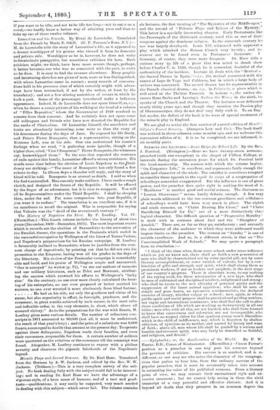Miracle Plays and Sacred Dramas. By Dr. Karl Hese. Translated
from the German by A. W. Jackson, and edited by the Rev. W. W. Jackson. (Triibner.)—This is a very complete survey of the sub- ject. No book dealing fully with the subject could fail to be interest- ing; and in reading Dr. Karl Hasa we have the advantage of a vigorous style, of a keen sense of humour, and of a tact ar.d good- taste—qualifications, it may easily be supposed, very much needed in dealing with this subject—which never fail. The volume contains
six lectures, the first treating of "The Mysteries of the Middle-ages," and the second of "Polemic Plays and Echoes of the Mystery." This latter is a specially interesting chapter. Early Protestants, like the Provencals of the thirteenth century, used this as one of their weapons against the dominant religion. In the sixteenth century its use was largely developed. Louis XII. witnessed with approval a play which attacked the Roman Church very keenly ; and in-
stances are to be found even in Portuguese literature. I Germany, of course, they were more frequent. Dr. Huse tells a curious story (p. 59) of a piece that was acted in dumb show before Charles V. in 1530, though ho is somewhat doubtful of the authenticity of the incident. Lecture iii. deals with the " Revival o the Sacred Drama in Spain,"—i.e., the revival connected with the names of Lope do Vega and Calderon, but in which a large body of writers was concerned. The sacred drama has its representative in the French classical drama,—as, e.g., in Palyeacte, n piece which is still acted at the ThAtre Frant•nis. In lecture v., the author dis- cusses Hans Sachs and Lessing's Nathan the Wise ; in the sixth, he
speaks of the Church and the Theatre. The lectures were delivered nearly thirty years ago, and though they mention the Passion-play of Oberammergau. they do not deal very fully with it. To an Eng lisp reader, the defect of the book is its want of special treatment of the miracle play in England.


































 Previous page
Previous page